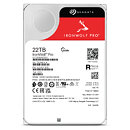TheLostSwede
News Editor
- Joined
- Nov 11, 2004
- Messages
- 18,584 (2.48/day)
- Location
- Sweden
| System Name | Overlord Mk MLI |
|---|---|
| Processor | AMD Ryzen 7 7800X3D |
| Motherboard | Gigabyte X670E Aorus Master |
| Cooling | Noctua NH-D15 SE with offsets |
| Memory | 32GB Team T-Create Expert DDR5 6000 MHz @ CL30-34-34-68 |
| Video Card(s) | Gainward GeForce RTX 4080 Phantom GS |
| Storage | 1TB Solidigm P44 Pro, 2 TB Corsair MP600 Pro, 2TB Kingston KC3000 |
| Display(s) | Acer XV272K LVbmiipruzx 4K@160Hz |
| Case | Fractal Design Torrent Compact |
| Audio Device(s) | Corsair Virtuoso SE |
| Power Supply | be quiet! Pure Power 12 M 850 W |
| Mouse | Logitech G502 Lightspeed |
| Keyboard | Corsair K70 Max |
| Software | Windows 10 Pro |
| Benchmark Scores | https://valid.x86.fr/yfsd9w |
Today, at the NAB 2023 conference, Seagate Technology Holdings plc, a world leader in data storage infrastructure solutions, introduced the new Seagate IronWolf Pro 22 TB conventional magnetic recording (CMR)-based hard disk drive (HDD). The company's highest capacity CMR HDD, the new drives deliver market-leading capacity, dependability, and powerful performance for multi-user workloads and enterprise RAID solutions
Optimised with Seagate's AgileArray technology, the new Seagate IronWolf Pro 22 TB HDD provides exceptional network-attached-storage (NAS), direct-attached-storage (DAS) performance and RAID reliability in multi-bay and multi-user environments. With user workload rates of 550 TB/year, the IronWolf Pro 22 TB HDD enables commercial and enterprise NAS users to seamlessly store, share, and collaborate on large amounts of data over a network. It also offers an SDR of up to 285 MB/s so users can seamlessly share files, back up, and tackle heavy workloads in multi-user NAS environments. With built-in rotational vibration (RV) sensors to provide RV mitigation, the HDD consistently delivers high performance and reliability in multi-bay systems.


The drive delivers a five-year limited warranty and up to 2.5M-hr MTBF for hassle-free data storage and best-in-class TCO. Also equipped with Seagate's IronWolf Health Management system and three years of complimentary Rescue Data Recovery Services, the Seagate IronWolf Pro 22 TB HDD gives users peace of mind knowing their data is secure.
The Seagate IronWolf Pro 22 TB HDD is available now for a list price of $599.99
View at TechPowerUp Main Site | Source
Optimised with Seagate's AgileArray technology, the new Seagate IronWolf Pro 22 TB HDD provides exceptional network-attached-storage (NAS), direct-attached-storage (DAS) performance and RAID reliability in multi-bay and multi-user environments. With user workload rates of 550 TB/year, the IronWolf Pro 22 TB HDD enables commercial and enterprise NAS users to seamlessly store, share, and collaborate on large amounts of data over a network. It also offers an SDR of up to 285 MB/s so users can seamlessly share files, back up, and tackle heavy workloads in multi-user NAS environments. With built-in rotational vibration (RV) sensors to provide RV mitigation, the HDD consistently delivers high performance and reliability in multi-bay systems.


The drive delivers a five-year limited warranty and up to 2.5M-hr MTBF for hassle-free data storage and best-in-class TCO. Also equipped with Seagate's IronWolf Health Management system and three years of complimentary Rescue Data Recovery Services, the Seagate IronWolf Pro 22 TB HDD gives users peace of mind knowing their data is secure.
The Seagate IronWolf Pro 22 TB HDD is available now for a list price of $599.99
View at TechPowerUp Main Site | Source




